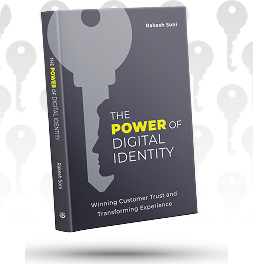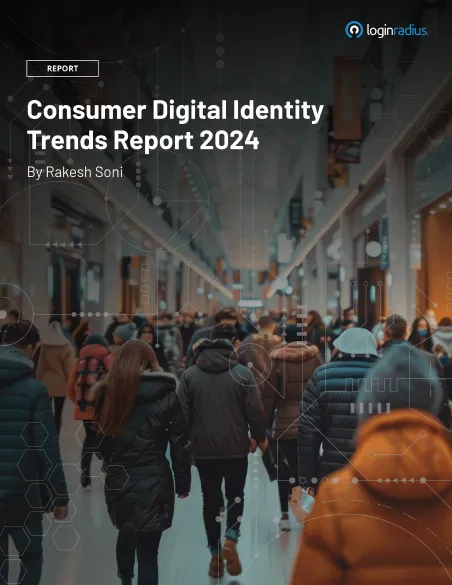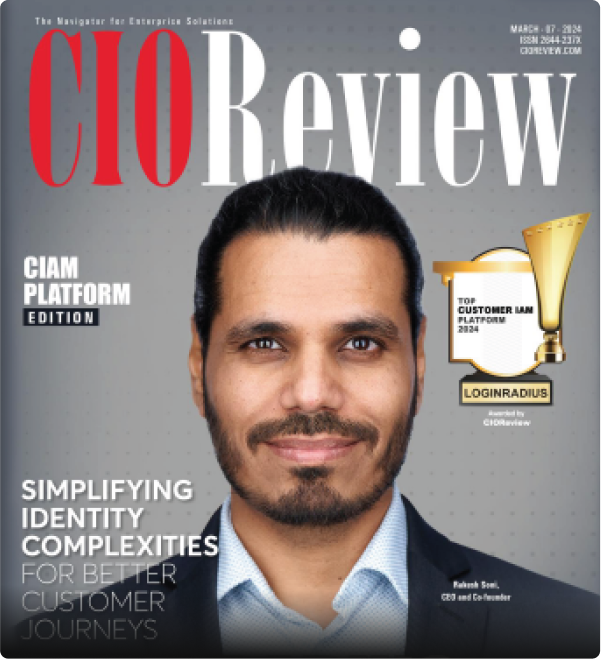Why Consumers’ Social Identities Matter & How You Can Protect It?
Consumer is king. Organisations have realized this in modern times. Due to globalization, competition has increased, and customers have many choices. Therefore, the best way to get a customer's attention is by providing a product that suits the consumer's social identity.

Table of Contents
- Introduction
- Why Does Social Identity Matter
- How Can You Protect a Consumer’s Social Identity
Introduction

Learn How to Master Digital Trust

The State of Consumer Digital ID 2024

Top CIAM Platform 2024
Introduction
You must have seen advertisements where a new product bought by a customer causes a stir in the entire neighbourhood. And suddenly, the product becomes the talk of the town and encourages other people to do the same.
Take another example of an advertisement where a certain product, let's say an automatic washing machine, positions its owner as a woman who is smart, savvy and an environment enthusiast.
All these marketing techniques are very common, and you can find them everywhere, promoting different products and brands. But the one thing that remains the same is the psychology behind this, i.e. social identity.
Every consumer in the market has a social identity that affects their preferences and responses to a certain product. Social identity is influenced greatly by the community to which a person belongs.
Therefore, to market and sell their products to people, organisations must have a proper understanding of the concept of consumer social identity. Organisations may receive favourable responses from their existing and potential consumers by tapping into the right social identity of a group.
This theory holds an important place in the marketing world as it explains consumer behaviour and how organisations can use it. Below, we have mentioned factors that make this concept crucial for business organisations.
Why Does Social Identity Matter
A consumer's identity can affect a business in many ways. Proper identification, the community they belong to, and the context can be the difference between a successful and an unsuccessful marketing campaign.
-
Tapping into customers’ desirable image
People are constantly using products and brands to create an image in today’s world. The image that a person wants to project depends heavily on the community they belong to. Intensive research on people's social behaviour around different groups and in different contexts can bring out how people want to position themselves in society. This can help companies create a brand image that fits their target audience's needs and desires.
-
Increased engagement
Consumers who are more connected to their social identity and community are more likely to associate themselves with a brand that they think represents their image to other people. Companies can use this as an advantage to attract more and more people with strong consumer social identities to position their brand with a specific quality or a strong USP.
Also Read: Walking the Fine Line Between Consumer Experience and Privacy
-
Customization
Consumer is king. Organisations have realized this in modern times. Due to globalization, competition has increased, and customers have many choices. The best way to get a customer's attention is by providing a product that suits the consumer's social identity.
The marketing strategy and consumer experience can be customized according to the needs and demands of the target group. This gives the organisation an edge over the competitors.
-
Converting potential customers into real consumers
Before making a marketing strategy, companies conduct various researches to understand consumer behaviour and preferences. From data collection to preparing a strategy to sell the product, social identity and the context in which it regulates play an important role. In many cases, people who respond positively to a product may not do the same in different contexts or social situations. This provides an incorrect estimate of potential customers and incorrect judgement of the marketing strategy's success.
To convert potential customers into real ones, organisations should observe their customers in different contexts, i.e. how their identity changes their reactions to the brand. Only then, the organisation will get a correct sense of consumer social identity.
-
Building brand loyalty
Many groups of people like to associate themselves with different brands to represent their social identity. This social identity can be changed easily. Marketing research, if done right, can tell the organisations a lot about the social identity of a certain group. By tailoring your brand to give out a certain image that fits the social image of the target audience, colonies can create brand loyalty.
How Can You Protect a Consumer’s Social Identity
Companies can gain insight into a person's social identity using various tools. This may include keeping information about a consumer's locality, age, social media, occupation, etc. This information collected by the organisations is sensitive and should be confidential.
Consumers are very concerned about their information, where it goes and how it is used. They are willing to give the information to make the experience smoother and more customized, but in return, they want security and anonymity of their data.
Implementing a robust CIAM solution can protect consumer data. These solutions provide authentication features like multi-factor and risk-based authentication to ensure that the consumer identities are always protected. The CIAM also allows customers to use their social identity to access applications.
CIAM enables personalisation and privacy by providing self-care controls that enforce consent and privacy at various stages of operations. It is beneficial for both businesses and customers.
Conclusion
Businesses can benefit from greater customer engagement and loyalty by providing customers with a platform that keeps their shared information safe. Customers, on the other hand, get the assurance of a secure and confidential experience.
Today, data is king. Sensitive information about the social identity of consumers is used by organisations for many reasons, but it's also organisations' responsibility to maintain privacy. This can only be achieved by investing in the best CIAM.

Featured Posts
Mastering Orchestration: The Business Case for End-to-End Identity Proofing Solutions
5 Breakthrough Innovations: How AI is Transforming Compliance
Happy Birthday, LoginRadius: One Year Away from the Big Teen Milestone!
Strengthening Digital Customer Onboarding to Combat Deep Fakes
The Strategic Impact of Customer Identity on Business Growth
How to Leverage Advanced Customer Identity Resolution for Better Marketing Outcomes
LoginRadius' Commitment to Responsible Disclosure For Customer Security
Can Cybersecurity Be a Unifying Factor in Digital Trade Negotiations?
Unlocking the Secret to Dominating the Market: How Can Give You a Competitive Edge
Strengthening Your Business Security: 7 Key User Access Management Best Practices
Navigating the Shifting Landscape of Data Privacy Regulations: Embracing Core Marketing Principles
Transforming Customer Experience: Enhancing CX through CIAM and Insights
The Power Of Consent Marketing- A Deep Dive Into Its Endless Advantages
Securing B2B SaaS: How Identity Management Leads the Charge Against Top 5 Security Challenges
The Power of Behavioral Biometric Authentication in Enhancing Security and CX Synergy
Enhancing Customer Retention with Magic Links: A User-Friendly Approach to Authentication
Strategic Insights: Leveraging Data Privacy for Marketers' Success
LoginRadius Recognized as the Top Customer IAM Platform of 2024 by CIOReview
SSO for SaaS Business: The Key to Boost Sales For Enterprises
How do CDP and CIAM Help Marketers in Cookieless Marketing?
How is CIAM Solution a Critical Part of DNBs’ Digital Transformation Strategy?
Seizing Opportunities: How Can Marketers Leverage Data Privacy for Success
Boosting Customеr Rеtеntion Ratеs With Stratеgiеs for Passwordlеss Authеntication
Exploring Modern Identity: Unraveling Customer Attitudes
Continuous Adaptive Trust - Adaptive Authentication Future
Unlocking Success: Marketing in a Cookieless World with Zero-Party Data
Unveiling the Customer Identity Business Case: Strategies for Success
Elevating Data Precision-Power of Identity Resolution
Making a Difference: LoginRadius' Sanitary Pad Donation Drive
8 Essential Insights for Enabling E-Commerce Social Login
Exploring the Vital Role of Consent Management for Your Online Store
Unveiling the Benefits of Identity Verification for Online Retailers
Customer-Centric Strategies: How CIAM and CRM Integration Optimize Consumer Experience
CIAM for Digital Marketers: The Key to Nurture & Convert Leads
What Is Identity Resolution And How Can It Benefit Your Business?
7 Tips on How CISOs Should Present Identity Security to Board Members
Happy Birthday, LoginRadius: Two Years Away From Becoming A Teenager
Why Identity Should Be At The Centre of Your Customer Strategy
Flexible Work Culture: A Game-Changer for LoginRadius and its Employees
The Growing Digital Enterprise: Achieving Success Through a Multi-Brand Strategy
Uncovering Consumer Sentiments on Modern Identity: A Deep Dive Into Their Behavior
Striking the Perfect Balance: Leveraging Identity Orchestration for Cost, Security, & Enhanced UX
Enhancing Customer Sign-In Journeys: The Power of Adaptive Authentication
Achieving Harmony: Balancing Identity Verification in the Customer Journey
Login Box Dilemma: Is it Boosting Your Brand or Driving Users Away?
Driving Success Through Customer Onboarding: The Role of Marketing Strategies
Enterprise-Level Security Trends: 5 Things to Know As a CEO
Exploring the Relative Importance of Identity in Today’s Digital Landscape
Unleash the Power of Your Identity Projects: A Guide to Maximizing ROI
Digital Identity: The Future of Successful Retail Operations
How Can CIAM Help Businesses Build Trust And Loyalty?
5 Reasons Why a Strong Customer Identity Strategy Can Benefit Your Business
Simplifying CX: How Passwordless Authentication Reduces Friction for Customers?
The Crucial Role of Security and CX in Providing Robust Authentication for Merchants
Why Should Social Login Be a Part of Your E-Commerce Marketing?
How to Target Your Ideal Customer with User Profile Management?
The Future is Now: Why Product Marketers Must Embrace CIAM Login
The Critical Role of SSO in Reshaping Digital Marketing Landscape
LoginRadius is Now Great Place to Work-Certified in India
How Important is Customer Health Scoring for SaaS Business?
An Exclusive CIAM Benefit: The Role of Access Management in Cost Optimization
Cyber Insurance in 2023: Takeaways For The Future And How To Prepare For It
How To Plan Your CIAM Budget In A Recession As We Look Ahead Towards 2023?
Your Digital Identity Is Changing - So, What Does It Mean For Customer Experience?
Your Ultimate Guide To Master CRO While Taking Care of Consumer Data Security
Inside the Business of Digital Privacy: A Profitable Opportunity
How Digital Identification Could Be the Key to Inclusive and Economic Growth?
Decoding the Business Advantage of Digital Privacy for Customers
How To Use Identity To Make Your Customers Feel Safe And Empowered?
Demystifying Identity Management For Revenue Generation - Going Beyond Compliance
How Authentication Leads The Way in Strategic Customer Acquisitions?
7 Tips For Your Enterprise To Have A Great Cybersecurity Awareness Month 2022
10 Things You Need to Know About Allowing Users to Login With Their Social Media Profiles
5 Reasons Why Publishers Should (Seriously) Consider Using SSO
How to Reduce Your Cloud Bills Without Compromising Security
The Future of Customer Experience is All About Advanced Identity
Renewing Your Security Vendor Contract? Know When It’s the Time to Switch
Why is Data Transparency Critical To Building Connected Consumer Journeys?
Authentication Has Gone Mainstream: Are Marketers Ready to Take the Responsibility?
How To Win the Era Of Customer-Centric Marketing?
How Progressive Profiling Reduces Registration Fatigue and Improves Lead Quality?
Planning to Reduce Your CPA By 50%? You Need ID Management
Earning Digital Trust in 2022: Where Should Businesses Invest?
Reaping the Benefits of the Cloud Beyond Marketing
How Identity Management Can Help You Avoid Targeting The Wrong Customers?
The Peerless Role of Cookieless Identity Solution for Marketers
How IT and Marketing Go Hand-in-Hand in the Business of Customer Identity Management?
The Evolution of Authentication: From Passwords to Passwordless & More
How Can Enterprises Deliver Better Customer Experiences with Unified Identity?
5 Signs Your Traditional IAM System Needs a CIAM Makeover
Decoding the Importance of People’s in Customer IAM
How Should Growth-Minded Enterprises Approach Customer Security?
Managing Privacy and Compliance in a Cookieless World
How Implementing the Right Identity Strategy Can Grow Your Business?
Tips to Make Verification Emails Effective: Best Practices & Examples
Driving Revenue Using LoginRadius' Customer Segmentation Insights
5 Reasons Why Frictionless Payments Matter To Marketers And Business Owners
7 Mistakes Companies Make During Digitization And Their Fixes
How Can Retailers Lead The Experience Economy While Securing Consumer Identities?
The Right Way to Use Identity Marketing in a Privacy-Centric World
Why Should You Use OTT Authentication in Your Lead Generation Funnel?
How to Create Brand Identity to Attract More Customers
How to Make a Strong Impression With Your Onboarding Process?
Finding The Balance Between Personalization and Data Privacy
Unlock the Business Benefits of Change Management in Securing Consumer Identity
How to Bring Stakeholders Together to Modernize CIAM Across Your Organization
A Successful Business Review Meeting Paves the Path for Your Business Success
Multi-Brand Ecommerce: Creating a One-Brand Experience Using SSO
Customer Authentication: Unfolding The Market Needs Of The Future
Implementing The Power Of Continuous Authentication for Boundless Business Value
What Should You Ask Your Identity Provider in 2022
Do Consumer Identity Programs Really Work for Personalized Marketing?
Why Consumers’ Social Identities Matter & How You Can Protect It?
Not Sure About Spiderman, But You Can Prevent Identity Disclosure
Sharing My Journey With LoginRadius: A Look Inside the Best Employee Perks
How to Blend Security with Frictionless User Experience
Why CMOs should care about CIAM
How CIAM can help in Preventing Abandoned Carts
Can Social Login Boost Conversion Rates? 5 Things Marketers Should Know
Why You Should Customize Your Marketing Programs Based on Consumer Journey
Can Authentication Convert Sales? 4 Authentication Tools for Every Retailer
4 Main Features of Enterprise Software
What are the Authentication Challenges in the Retail Industry?
How B2C Industries are Leveraging CIAM in the Retail Supply Chain Management
Decoding the Role of Multi-Factor Authentication and IVR in Banking
Embracing Risk-Based Authentication in the Gaming Industry
10 Ways To Improve Your eCommerce Store's Security
How CISOs Can Improve Collaboration on Security Risks
7 Expert Tips on How to Improve the Customer Experience
5 Key CIAM Benefits and Challenges in the Retail Industry
8 Common Challenges With Your SaaS Business that CIAM Can Solve
8 Common Challenges With Your SaaS Business that CIAM Can Solve
How Good Transaction Security Ensures Smooth Consumer Visits
How Does the Future Look Like for the Authentication Services Market?
How MFA Makes Quick Service Restaurants (QSR) Promotion Fraud-Free
How Consumer Identity Influence Brand Recognizability
The ABCs of a Successful Saas Onboarding Process
A Glimpse of LoginRadius' CSR Activities: How Do We Foster a Culture of Care
10 Tips to Ensure Your Wi-Fi is Private and Blocking Hackers
Why Should You Implement Social Login Authentication?
9 Facts About Social Login & CRO That You Should Know About
Enhance Your Consumer Experience in Insurance Companies With CIAM
7 Best Practices for Securing Your Remote Workforce with Identity Management
Personalize Your Marketing With The Help Of A CIAM Platform
Using LR Digital Identity to Build the Public Sector of the Future
Role of Consumer Identity Authentication in Digital Banking
From Sign-Up to Purchase – How LoginRadius Offers a Frictionless Consumer Journey
How Customer Identity Solution Drives Digital eCommerce Success
Top 3 CIAM Indicators That You’ll Get the Consumer Satisfaction You Deserve
How to Make Your Automated Emails Sound Personal, Relevant, and Effective?
Omnichannel CX : Your Key to Consumer Experience Success
How QR Codes are Shaping the Future of Marketing
Why Brand Authenticity is Important & How to Build it
Consumer Onboarding Strategies for SaaS Businesses
A Glimpse into My 1-Year Journey at LoginRadius as a CSM!
3 Product Marketing Tips for B2C CMOs
Boost Creativity With The Best Brainstorming Tools And Techniques
Why Should You Have A Blue Checkmark In Front of Your Twitter Account
Social Media Video Marketing: What Is In Store For Future Marketers
Will Focusing on Relationship Marketing Boost Your Business Sales?
COVID-19 Vaccine Success in USA and Remote Working – What’s The Connection
Want to Learn Copywriting? 3 Tips That Will Keep Readers Glued to Your Content
Cybersecurity Tips for Ecommerce Websites
Myth or True - Is AI Really Transforming the Digital Marketing Industry?
5 Features of Google My Business You Should Be Using
The Digitization of Agile Marketing Principles - How Has It Changed Over the Years
How to Use Twitter for B2B Marketing in 2021
Benefits of Google Tag Manager — Easy To Use And Easy To Launch
Website Heat Mapping with Hotjar vs. Microsoft Clarity
Duplicate Content and SEO: What’s the Big Deal
Top 5 tools to Audit Wordpress Website
A Brief Guide to Online Reputation Management (ORM)
Instagram vs Facebook – Which One is Better for Your Business in 2021?
10 Video Marketing Stats That Brands Can't Ignore in 2021
Three Unique PR Trends to Consider in 2021
5 Quick Steps to Leverage your Website for More Conversions
Top UI/UX Design Tools 2021
Why Video Testimonials Are A Marketing Must
Top 5 Marketing Strategies to Power-up Your Business
Top 10 Tips to Enhance Your Creativity While Working From Home
Does Your Site’s Imagery Reflect Your Brand Identity
B2B Lead Generation for 2021: 11 Proven Strategies
Steps to Grow Your Emotional Intelligence for Better Consumer Relations
How to Boost Your B2B Marketing Strategy with Hyper-Personalization
Inbound Vs Outbound: Which Marketing Strategy is Best for You
7 Best Marketing Emails to Attract Consumers Right Away
Growth Hacking: What it is and How SaaS Businesses Can Use it to Optimize Growth
Thinking Beyond the Pandemic: How to Make Marketing Plans After Coronavirus
8 Effective Communication Strategies for Internal Alignment and Growth in 2021
How to Drive in the Highest Quality Leads in 2021 with Content and SEO
20 Content Ideas for Most Engaging B2B LinkedIn Posts
Why is Consumer Onboarding Critical for Startups
How Customer Retention Can Help Businesses Grow
Why Is Customer Relationship Important for Every Business in 2021
Customer Success: The Importance of Customer Onboarding
7 Tips and Tricks for B2B Consultant: How to Grow Your Client's Business
Walking the Fine Line Between Consumer Experience and Privacy
5 Tricks to Attract MORE Consumers to Your Website
5 Steps to Build a High Performing Growth Team in 2021
5 Tips for Choosing the Right Password Manager for Your Team
Hybrid Workforce: Laying The Foundation of Remote Working
How to Shift Focus From Consumer Management to Consumer Engagement
How to Deliver the Perfect Consumer Support System for SaaS Companies
13 Tips for Leading and Managing Remote Teams
How to Achieve a 360-Degree Growth with Data-Driven Approach
Top 27 User Onboarding Tools: Highly Recommended for Businesses
5 Tips to Enhance the Consumer Experience in B2B SaaS
Engineering As Marketing: 5 Growth Hack Strategies For Modern Businesses
North Star Metric: 6 steps to discover your NSM
9 Signup Tips To Skyrocket The Conversion Rate
Enhancing Customer Experience in Airlines With LoginRadius
Enhancing Customer Experience in Retail Industry
Deliver Exceptional Omnichannel Customer Experience [Infographic]
Improving Customer Experience in the Hospitality Industry
Digital Trends Transforming the Media and Entertainment Industry in 2020
Improving Customer Experience in the Gaming Industry
LoginRadius Gets into the Christmas Spirit (of Giving)
5 Ways to Enhance Customer Experience in E-commerce
How To Throw A Tiki Tech Party
Improving Fan Experience in the Sports Industry
4 Things to Consider When Starting a Digital Transformation
Test Cases For Your E-commerce Payment Gateway Page
A Complete Color Scheme Guide For Your Website
Spice Up Your Resume: Create a Visual One
The Ultimate Guide to Craft Sign-up Forms That Convert Like Crazy
10 Smart Tips to Make You More Resilient At Office
Fight Mediocrity at Your Workplace, Dare to be Awesome!
How To Insert Keep Notes in Doc Plus other Keep Tips For Better Productivity
11 Slack App Integrations to Boost Productivity at Your Workplace
Don’t Waste Time! Facts to learn to write the Best Professional Bio
16 Best Writing Tools and Software For A Creative Blogger [ Free tools Inside]
How To Be A Pro At Slack In 6 Simple Steps
The Ultimate Guide To Create Professional Email Signatures With Examples
Free Resources That You Might Not Have Heard Of
